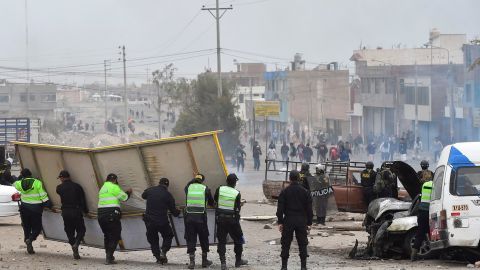CNN
—
Peru’s new President Dina Boluarte has proposed bringing general elections forward two years to April 2024, during a televised speech delivered early Monday morning, amid ongoing protests throughout the country.
“Interpreting the will of the citizens… I have decided to take the initiative to reach an agreement with the Congress of the Republic to advance general elections to the month of April of 2024,” Boluarte said in the televised address.
Boluarte became Peru’s first female president last week after lawmakers removed her predecessor Pedro Castillo.
She initially ruled out early elections last week, but protests calling for political change have ensued around the country, leaving at least two people dead and prompting the United Nations Human Rights Office to air its concern about escalated tensions.
“With violence increasing as protests continue in Peru, we are deeply concerned that the situation may escalate further,” its spokesperson Marta Hurtado said. “Given the number of protests, including strikes, planned for this week, we call on all involved to exercise restraint.”
Since last week, protests erupted in cities across the country in support of Castillo, who is currently under a seven-day preliminary arrest ordered by Peru’s Supreme Court.
Demonstrators have called for another general election, the dissolution of Congress, and the creation of a new constituent assembly, according to the radio and television broadcaster Radio Programas del Perú.
On Saturday, protesters also demonstrated in the city of Andahuaylas, which left at least 20 people injured including four police officers, according to Peru’s Ombudsman’s Office.
Peru’s Ministry of Health said Sunday evening that two people have died and three hospitalized in the Apurímac Region, where Andahuaylas Province is located, as a result of the protests.

On Monday, Alfredo Rodriguez Ballon airport in Peru’s largest southern city of Arequipa was temporarily closed due to protests, according to a statement by the Andean Airports of Peru, tweeted by the country’s Ministry of Transport and Communications.
“Our Alfredo Rodriguez Ballón airport in the city of Arequipa has been invaded by a group of protesters who have entered through the perimeter fence, destroying the security infrastructure and setting fire to security gate, which has put the safety of passengers, our team and air operations at risk,” read the statement.
Images of the scene showed smoke in the distance while protesters walked on the airport’s runway.
The airport evacuated those inside the terminal, and later on Monday, officials told local media that the situation was “under control.”
“The situation at Arequipa is under control, police has control of the airport (inside). We ask citizens to exercise their right to protest but in a peaceful way and not to put at risk people’s lives,” Angel Manrique of the Ombudsman’s Office in Arequipa said in an interview with local radio RPP on Monday.
In footage from the southern city of Ica, a vehicle was overturned and protesters blocked streets. Police were seen clashing with demonstrators, who were throwing stones at the forces.
On Sunday, at least 50 people, including police officers and airport workers, were also being held as “hostages” after attacks and “acts of vandalism” by protesters at the Huancabamba de Andahuaylas airport in the city of Andahuaylas, the Peruvian Corporation of Airports and Commercial Aviation said in a statement.
The airport has been closed as a result, the organization said, adding that they have asked the national police for support and reinforcement and to help “safeguard the lives of the people who are being held hostage.” The organization did not provide information on the condition of the hostages.
Peru’s Corporation of Airports and Commercial Aviation accused protesters of setting fire to the airport’s transmission room, fuel room and encircling the terminal with “acts of violence,” it said in a statement. It also said the landing strip and essential equipment had been “seriously affected.”
The country has been on the brink since Castillo’s ouster last week.
Many Peruvians have been calling for a change in the political guard, according to September poll by the Institute of Peruvian Studies (IEP), which found 60% of those surveyed supported early elections to refresh both the presidency and Congress.
Boluarte’s ascendency to the presidency may not necessarily ease Peru’s toxic and embittered political landscape.
Fernando Tuesta Soldevilla, professor of political science at Pontifical Catholic University of Peru (PUCP), told CNN that Boluarte “does not have a recognized political career. And without partisan support, political party or social organization behind her, she is weak from the beginning.”
“Everyone knows when Dina Boluarte’s government began, but no one can be sure how long it will last,” he said.